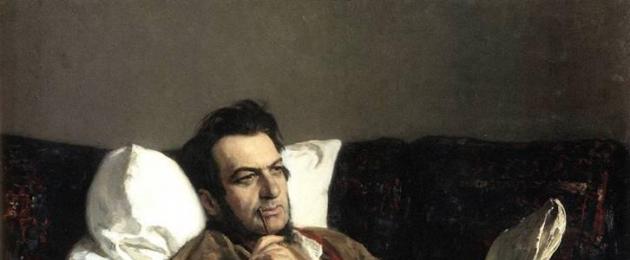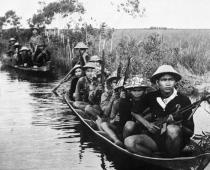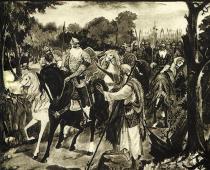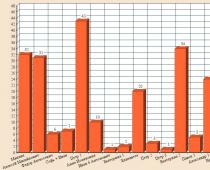Municipal educational institution "Secondary school No. 1"
Safonovo
Smolensk region
Lesson study
"Deeds of bygone days, legends of antiquity deep."
(Based on the poem by A.S. Pushkin "Ruslan and Lyudmila")
5th grade
Teacher of Russian language and literature
Sopova Elena Grigorievna
| Lesson topic | « Deeds of bygone days, legends of antiquity deep. (Based on the poem by A.S. Pushkin "Ruslan and Lyudmila") |
| Goals | Analysis of the poem "Ruslan and Lyudmila" in order to show the moral beauty of the characters, their desire for good, patriotism. To develop through the word interest in the historical past of their country and language. Teach expressive reading, monologue speech, research skills. |
| Number of hours | |
| Content elements | The brightest representatives of the Great world literature. The history of the creation of the poem by A.S. Pushkin "Ruslan and Lyudmila". Pushkin's lively interest in oral folk art, in the fabulous and fantastic. Plot, composition, artistic world of the poem. Ruslan, his assistants and opponents. Pushkin's poem is a triumph of true love, the moral purity of heroes, honor, duty, and mercy. Group work. Analysis of the episode "Ruslan's fight with the Pechenegs". The game "Who carefully read the poem?" |
| Types of learning activities | Receptive : home reading of the poem, reading the episode "Ruslan's fight with the Pechenegs." reproductive : expressive reading of excerpts from the poem, answers to questions of a reproductive nature. Productive creative: analysis of the episode (in groups), oral verbal drawing, competition for a connoisseur of the poem, stories about heroes, creating illustrations for the poem. Research: the role of sounds, mood changes, metaphors, fairy-tale elements, verbs, obsolete words in the episode "Ruslan's fight with the Pechenegs". |
| Requirements for the level of preparation of students | Know what a poem is, a legend. Understand the general movement of the plot, the idea of the poem, the characters of its characters. Be able to find fairy-tale elements, compose a story about the heroes of the poem, justify the illustrations of artists and correlate them with the text of a work of art, create your own illustrations, select material for the story, compress the text. |
| Intra-subject and inter-subject communications | Russian language : figurative and expressive means, work with obsolete words, phonetic means of expressiveness (alliteration), vocabulary work (patriotism). History : raids of the Pechenegs on Ancient Russia. art: familiarization of students with illustrations for the poem. (Artists K. and B. Kukuliev, Viktor Korolkov). Create your own illustrations. Music : overture by M.I. Glinka to the opera "Ruslan and Lyudmila". Analysis of the episode "Ruslan's Fight with the Pechenegs" to the music of D. Shostakovich (Symphony No. 10). |
| Types of control | Explain the meaning of A.S. Pushkin: “Respect for the past is the feature that distinguishes education from savagery”, “There is a Russian spirit ... there it smells of Russia.” Episode analysis. Interview with students. |
| Homework | portrait sketch of the hero; |
Equipment.
1. Portrait of A.S. Pushkin.
2. Portrait of V.A. Zhukovsky.
3. Reproduction of a painting by Yu.V. Ivanov Pushkin and Arina Rodionovna.
4. Portrait of M.I. Glinka.
5. Photo of the 1st edition of the poem "Ruslan and Lyudmila". 1820
6. Portraits of Shakespeare, Goethe, Cervantes, Dante, Petrarch.
7. Explanatory dictionary S.I. Ozhegov.
8. Explanatory dictionary of the living Great Russian language in 4 volumes by V.I. Dahl.
9. Illustrations for the poem. Artists K. and B. Kukuliev. Artist Viktor Korolkov.
10. Students' illustrations for their favorite episodes.
11. Exhibition of fairy tales by A.S. Pushkin entitled "What a charm these fairy tales are!"
12. Map of Ancient Russia.
13. Dictionary of Pushkin's language in 2 volumes.
Preliminary tasks received by students in groups.
1 group. Readers (5 people):
1st student reads the "Prologue" by heart;
4 students read by heart from song 6 episodes “The Siege of Kyiv”, “The Battle of Ruslan with the Pechenegs”.
2 group. Storytellers and experts in history (2 people):
1st student transmits a summary of the poem (training in text compression).
The 2nd student talks about the attack of the Pechenegs on the ancient Russian state (collects materials independently).
3rd group. Lovers of literature, interpreters of obsolete words (2 people):
Students in alphabetical order compile a dictionary of obsolete words, determine their role in the poem.
4 group. Researchers of human characters (5 people):
Students characterize Ruslan's 3 rivals using quotes and trace the path of each hero. Draw a road map
a) Rogdaya;
b) Farlaf;
c) Khan Ratmir.
Students talk about Ruslan's helpers:
a) Finn
b) head.
5 group. Researchers of human characters (3 people):
Based on the text of the poem, students talk about Lyudmila.
6 group. "Artists" (other students):
present their illustrations for the poem "Ruslan and Lyudmila", talk about the creation of drawings; about the episode depicted on it, justify their choice.
Lesson study
“The affairs of bygone days, the legends of antiquity deep” (based on the poem by A.S. Pushkin “Ruslan and Lyudmila”).
Respect for the past
characteristic of education
from wildness...
A.S. Pushkin
There is a Russian spirit ... there it smells of Russia!
A.S. Pushkin
During the classes
I. Introduction
1. Teacher's word
In every great literature there is a writer who constitutes a separate Great Literature: in England - Shakespeare, in Germany - Goethe, in Spain - Cervantes, in Italy - Dante and Petrarch.
In Russian literature, this is A.S. Pushkin.
No matter how many times we re-read Pushkin, a wave of delight rises in our souls from some unknown depths, born from painfully familiar lines.




2. The student reads the passage "At the seaside"
3. Word of the teacher (continued)
You heard a mysterious and slightly mocking description of the fabulous Lukomorye in the introduction to the poem "Ruslan and Lyudmila". This is the first poem by A.S. Pushkin. He began to write it at the Tsarskoye Selo Lyceum (1817) and continued to work on it already in St. Petersburg.


The success of the poem was extraordinary. Vasily Andreevich Zhukovsky,
considered Pushkin's teacher in poetry, gave him his portrait with the inscription: "To the winner-student from the defeated teacher on that highly solemn day on which he graduated from the poem" Ruslan and Lyudmila ", 1820, March 26, Good Friday."
And the winner-student was 20 years old. The first edition of the poem was published in St. Petersburg in 1820.
4. The poem is written in the spirit of those folk tales that Pushkin heard or read. Why does the poet have such a keen interest in oral folk art, in the fabulous and fantastic?

Captivating old legends and epics, told by the nanny Arina Rodionovna, the keeper of folk wisdom and fantasy, led into the world of miraculous transformations. Having become a poet, Pushkin blossomed them with his wonderful poetic fantasy, turned them into wonderful poems and songs that we read and
today.
II. Main part
Conversation with students
Our lesson is called "Deeds of bygone days, legends of antiquity deep."
1. Read the 1st epigraph. How do you understand these lines?
Pushkin understood well: an educated person should know and respect the historical and cultural roots of his country. In this we are helped by works of oral folk art, in which the people act as the custodian of Russian traditions, national art.
2. At home you read an unusual poem. What is a poem?
A narrative work in verse, usually on a historical or legendary subject.
“... I will now tell this tale to the world ...” And not out of nothing to do, Pushkin turned to the fairy tale genre. Obviously, he wanted to tell us something of his own, secret, suffered.
And we will try to get closer to the mystery of Pushkin's lines, admire, reflect...
On January 29, 1837, severely wounded in a duel by Dantes, Pushkin died. Already in the autumn of the same year, our countryman M.I. Glinka played excerpts from the new opera to his friends.

(M.I. Glinka's overture to the opera "Ruslan and Lyudmila" sounds)
4. What did you imagine while listening to this music?
5. And now let's talk. Did you like the poem?
6. Why is it called that?
7. What can you say about the heroes of the work? Who are they?
8. Which character do you like the most? And what?
9. Which of the heroes could we call a negative character? Why?
10. And now let's play. A game! Who carefully read the poem?
Where was the hereditary village of Farlaf located?
near Kiev. We learn this from the words of the old woman, who advised Farlaf to return "to solitude, in his ancestral village" to remain better without worries: "Lyudmila will not leave us."
Why did Ruslan not lose heart, what did he hope for?
He hoped not only for the prediction of the old man (“The terrible Chernomor Wizard ... will die by your hand”). Ruslan understood that he had to fight for his beloved, that “the fate ... of the coming days” was in his will. The young prince had to snatch Lyudmila from captivity at all costs.
Who was the old man before meeting Naina?
Shepherd. ("Shepherd, I don't love you!")
Who does Pushkin call "the seeker of bloody battles, the pet of the battle"?
Rogdaya.
11. What is a tradition?
This is a story that passes from generation to generation about the past, a legend. The poem combines the fabulous and the real in a bizarre way.
12. Name the fabulous elements in the poem.
13. Try using one word to determine what this work is about. Define its theme.
We'll all be right to say that this poem
about love;
about the victory of good over evil;
about friendship and hatred.
But it is also a patriotic poem. This is a poem about Russia: “There is a Russian spirit, there it smells of Russia!”
14. Who among you can say what patriotism is?
15. Lexical work (with the explanatory dictionary of S.I. Ozhegov).
Patriotism is devotion and love for one's Fatherland, for one's people.
A patriot is a person devoted to the interests of some cause, deeply attached to something.
III . Working with groups
1. What episode tells about the patriotism of the protagonist?
This is the siege of Kyiv and the battle of Ruslan with the Pechenegs. Song 6.
2. What do you know about this from history?
A trained student tells about the raids of the Pechenegs on Ancient Russia. (Group 2)
The Pechenegs are a union of Turkic nomadic tribes, formed in the 8th-9th centuries. in the steppes between the Aral Sea and the Volga. According to The Tale of Bygone Years, the Pechenegs first came to Russia in 915. Having concluded a peace agreement with Prince Igor, they went to the Danube.
In 968, the Pechenegs besieged Kyiv. The Kyiv prince Svyatoslav lived at that time in Pereyaslavl on the Danube, and Olga remained in Kyiv with her grandchildren. Only the cunning of the youth, who managed to call for help, allowed the siege to be lifted from Kyiv.
The raids of the Pechenegs were repeatedly repulsed by Prince Vladimir Svyatoslavovich. In 1036, the Pechenegs again besieged Kyiv, but were defeated by Prince Yaroslav Vladimirovich the Wise and left Russia forever.

3. And here is how Pushkin told about it in the poem.
Students from I group:
1 - from the words "Kiev people are crowding on the wall of the city", ending with the words "From
a faithful retinue of princes is preparing for a bloody battle”;
2 - from the words “And the day has come. Crowds of enemies with the dawn moved from the hills,
ending with the words "The mournful groan of the fallen and Russians was heard
knights of prayer";
3 - from the words "The morning shadow grew pale, the wave turned silver in the stream",
ending with the words “Rushed in the footsteps of the hero, fought ... perish,
basurman";
4 - from the words “Encompasses the horror of the Pechenegs; pets stormy raids are calling
scattered horses", ending with the words "Crowding around with cries,
and joy revived the prince.
4. We have now mentioned the name of the main character, but before proceeding to the direct description of all the heroes, let's recall the summary of the poem.
 (Student II group conveys a summary of the poem, presenting their work)
(Student II group conveys a summary of the poem, presenting their work)



5. There are many obsolete words in the poem. Presenting the word to students Group III.
6. What is the role of obsolete words in the poem?
They not only recreate the past era, but are also expressive means of the language: they give the speech a sublimely romantic, solemn, sweet sound.
7. Analysis of the episode "Ruslan's fight with the Pechenegs".
Groups receive assignments and work to the music of D. Shostakovich (Symphony No. 10).
Pale morning shadow
The wave rippled in the stream
A doubtful day was born
In the foggy east.
Clear hills and forests,
And the heavens woke up.
Still in idle rest
The battlefield slumbered;
Suddenly the dream was interrupted: the enemy camp
He rose up with noisy anxiety,
A sudden cry of battle broke out;
The heart of the people of Kiev was troubled;
They run in discordant crowds
And they see: in the field between enemies,
Shining in armor, as if on fire,
Wonderful warrior on a horse
A thunderstorm rushes, pricks, cuts,
In a roaring horn, flying, blows ...
It was Ruslan. Like god's thunder
Our knight fell on the infidel;
He roams with carla behind the saddle
In the midst of a frightened camp.
Wherever a formidable sword whistles,
Where an angry horse rushes,
Everywhere the heads fly off the shoulders,
And with a cry, line upon line falls;
In an instant, a scolding meadow
Covered with mounds of bloody bodies,
Alive, crushed, headless,
A mass of spears, arrows, chain mail.
Squads of equestrian Slavs
Rushed in the footsteps of the hero,
Fought... perish, basurman!
Task for group I
Watch the change of mood in this passage. Why it happens?
Task for group II
Find words used in a figurative sense. What is their role in the line?
Task for III group
What is the role of verbs in the description of combat?
Task for group IV
Find the fabulous elements in this passage. What is their role?
Task for group V
What sounds help create the image of combat? What is their role in this passage?
Task for group VI
Find obsolete words. Determine their meaning.
Student performance
Teacher's conclusion
So, with the help of the contrast construction of the episode, the use of obsolete words, metaphors, fairy-tale elements, personifications, expressive verbs, alliteration, the great Pushkin emphasizes the tension, the dynamics of the battle, glorifies the heroism of Russian soldiers, brings the events of "long gone days" closer. And Ruslan became a symbol of courage, military prowess, devotion to his fatherland.
8. In addition to Ruslan, three of his rivals went in search of the beautiful Lyudmila: Rogdai, Farlaf and Khan Ratmir. Describe each of them using quotes from the text. Follow the path of each of them.
Students speak Group IV:
1 student characterizes Rogdai;
2 student characterizes Farlaf;
3 student characterizes Khan Ratmir.
9. Why do you think none of them managed to find Lyudmila?
10. Speaking about Ruslan's rivals, we found out that all of them were helped by evil forces in the form of the witch Naina. But in any fairy tale there must be good forces that oppose evil and stand on the side of the protagonist. Who helps Ruslan?
Prophetic Finn and the Head.
Students speak Group IV:
The 4th student talks about Finn (describes Ruslan's 1st meeting with the prophetic Finn).
What do we learn from the elder's story?
How did he manage to help the main character?
How do you imagine this old man?
Draw a picture of him orally.
The 5th student describes Ruslan's 2nd assistant, the Head, and tells what he learned about the fate of the heroes, about a close relative of this miracle.
11. How did Ruslan meet Chernomor? Why did Ruslan manage to defeat him?
12. But we have not yet said anything about one heroine of the poem - Lyudmila.
V students groups say:
Who is Ludmila?
When do we first meet her?
What can you say about the appearance of the heroine? Find lines in the text that would help us create her portrait.
Tell us about Lyudmila's wanderings through the magical castle and gardens of Chernomor.
How did Lyudmila manage to deceive the evil wizard?
13. What helped Ruslan find his Lyudmila? Is it only his magical assistants?
IV . Working with illustrations
1. The word of the teacher.
Artists K. and B. Kukuliev and Viktor Korolkov created wonderful illustrations for the poem. They have so much imagination! The poem seemed to come to life in colors and images.
What illustrations did you make?
2. Student performances group VI.
Each "artist" tells about the creation of his drawing, about the episode that is depicted, and justifies his choice.
V . Summarizing
1. What gave you guys a reading of the poem by A.S. Pushkin "Ruslan and Lyudmila" What did you learn from Pushkin?
2. The word of the teacher.
We studied a wonderful work, which is based on "the deeds of bygone days, the legends of ancient times", but it is interesting to us today, because it sings of the triumph of true love - a feeling that is invincible by any evil in the world; sings of goodness and beauty, friendship and fidelity, love for one's land, for one's people; teaches to see the human in a person.
Take a look at these books. These are Pushkin's fairy tales, which he wrote much later than the poem "Ruslan and Lyudmila", already after 30 years.
(Exhibition "What a charm these fairy tales are!")
3. What are the tales of A.S. Have you read Pushkin?
4. The word of the teacher.
I would like to emphasize that Pushkin's fairy tales are much more complicated, deeper than they seem at first glance, so we will turn to them in high school, since it is from the poem "Ruslan and Lyudmila", from fairy tales, that strings are pulled to everything: to the Russian character, moral purity heroes, to the understanding of honor and duty, to mercy and family.
As you grow older, other poets, good and worse, will inevitably come into your life. But Pushkin will never get old. The words sound prophetic: “In the distance from you, I will be inseparable from you.”
Pushkin is eternal, like the Motherland.
VI. Homework
Write a creative work on the topic "My favorite Pushkin hero" (based on the poem "Ruslan and Lyudmila").
Select a "genre" of creative work:
fairy tale-poem about the new adventures of Pushkin's hero;
a letter to a friend about a meeting with the beloved hero of the poem;
portrait sketch of the hero;
interview with Pushkin's hero;
comparative characteristics of the hero of Pushkin's poem and the fairy-tale hero.
Try to colorize your work.
VII . Creative work of students (excerpts)
Mighty hero Ruslan.
The protagonist of the poem is the brave prince Ruslan. He with honor withstood all the trials that fate doomed him to.
When the terrible sorcerer Chernomor treacherously stole his bride, Ruslan, ready to overcome any difficulties, went in search of his beloved without fear.
Ruslan has a strong character and a kind soul. This is a brave, unstoppable, valiant and skillful warrior. The love, loyalty and infinite courage of the hero overcome both the distrust of the old prince, and the evil machinations of the dwarf wizard, and the deceit, and betrayal of a cowardly rival.
Nazarov Anar.
Russian knight Ruslan.
This is a powerful warrior who embodies such qualities as valor, nobility, physical strength. This is a hero who was not afraid to fight the forces of evil.
In all situations, he manifests himself as a brave, generous, courageous knight. He is the embodiment of a Russian patriotic warrior.
Roschin Oleg.
Ruslan is the hero of the Russian land.
Poem by A.S. Pushkin's "Ruslan and Lyudmila" is an amazing work about love and fidelity, courage and valor, deceit and cunning.
The protagonist of the poem is the brave prince Ruslan. Having dealt with the hordes of Pechenegs who besieged Kyiv in an instant, he reminds me of the hero Ilya Muromets.
Ulman Christina.
Ruslan is my favorite character.
The last page of the poem by A.S. Pushkin "Ruslan and Lyudmila", which left a lot of positive emotions.
Having gone in search of Lyudmila, Ruslan overcame his rivals, destroyed all obstacles, defeated the enemy hordes.
The brave and brave Ruslan also defeated Chernomor in a rebellious battle. Ruslan's main weapon was love for his native land, his beloved girl. But love works wonders.
Pushkarev Yaroslav.
Ratmir - "young Khazar prince".
He is handsome and well built. Despite his youth, "chosen by glory", the khan glorified his sword in bloody wars.
Ratmir is hot, ardent, voluptuous. Once in the castle, in the circle of charming maidens, he quickly forgot about Lyudmila.
At the end of the poem, I learned that Ratmir left "the anxieties of fighting life and the sword that he glorified" for the sake of pure love for his girlfriend and became a peaceful and unknown hermit.
Ratmir is the only one of the rivals who wished Ruslan happiness, victories, glory and love.
Stepanenko Ivan.
Literature
1. Golub, I.B. Stylistics of the Russian language. - M.: Rolf, 2001. - 448s.
2. Dal, V.I. Explanatory dictionary of the living Great Russian language. In four volumes. - M.: Russian language, 1998.
3. Journal "Literature at School", No. 4, 1999.
4. An open lesson in literature: Russian classical literature (Plans, notes, materials): A guide for teachers / Editors-compilers: I.P. Karpov, N.N. Starygin. - 2nd ed. - M.: Moscow Lyceum, 2001. - 420p.
5. Dictionary of obsolete words / Comp. Tkachenko N.G., Andreeva I.V., Basko N.V. - M.: Rolf, 1997. - 272p.
6. Poems. Poems. - M.: Eksmo-press, 2002. - 606s.
- In contact with 0
- Google Plus 0
- OK 0
- Facebook 0








